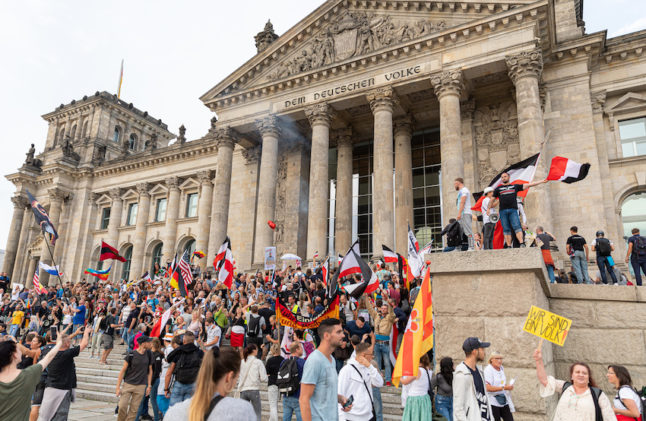Five men and one woman were sentenced by the Tiergarten District Court to fines for breach of the peace, insulting police officers, and displaying the Hitler salute, the state prosecutor confirmed.
The prosecutor initiated 346 investigation proceedings, most of them against unknown individuals, newspaper die Zeit reports. 89 participants were identified. The six people found guilty–from Berlin, Brandenburg, and Baden-Württemberg–received fines ranging from €1,800 to €2,500.
On August 29th 2020, tens of thousands of people protested against Covid-19 restrictions in Berlin. Among them were right-wing extremists from the Reichsbürger movement, and conspiracy theorists.
Police said about 38,000 people, double the number expected, had gathered in Berlin to protest against restrictions imposed to curb the spread of the coronavirus, such as the wearing of masks and social distancing.
Several hundred protesters broke through barriers and a police cordon to climb the steps leading to the entrance to the Reichstag.
They were narrowly prevented from entering the building by police, who used pepper spray and arrested several people.
The Reichstag, where German deputies meet, has a powerful symbolic role in the country.
The building, with its famous dome, was burnt down by the Nazis in 1933 in an act aimed at destroying what remained of German democracy between the two world wars.
About 300 people were arrested on the day in scuffles with police, in front of the Reichstag but also outside the Russian embassy not far from there in the city centre, where protesters pelted police with bottles.
Berlin city authorities had initially decided not to allow the demonstration to go ahead, fearing that the protesters would not keep a distance of 1.5 metres (five feet) apart or comply with face mask requirements.
The ban sparked outrage from organisers and their supporters who flooded social media with angry messages vowing to protest anyway, with some even calling for violence.
But on the eve of the demo, Berlin’s administrative court sided with the demonstrators, saying there was no indication that organisers would “deliberately ignore” social distancing rules and endanger public health.
Protesters waved German flags and shouted “Merkel must go!”, a chant often used by the far-right Alternative for Germany (AfD) party against then Chancellor Angela Merkel.
Some carried the flag of the German Reich which was used up until 1919.
“To see the flags of the Empire in front of the parliament is shameful,” tweeted then Foreign Minister Heiko Maas at the time.



 Please whitelist us to continue reading.
Please whitelist us to continue reading.
Member comments